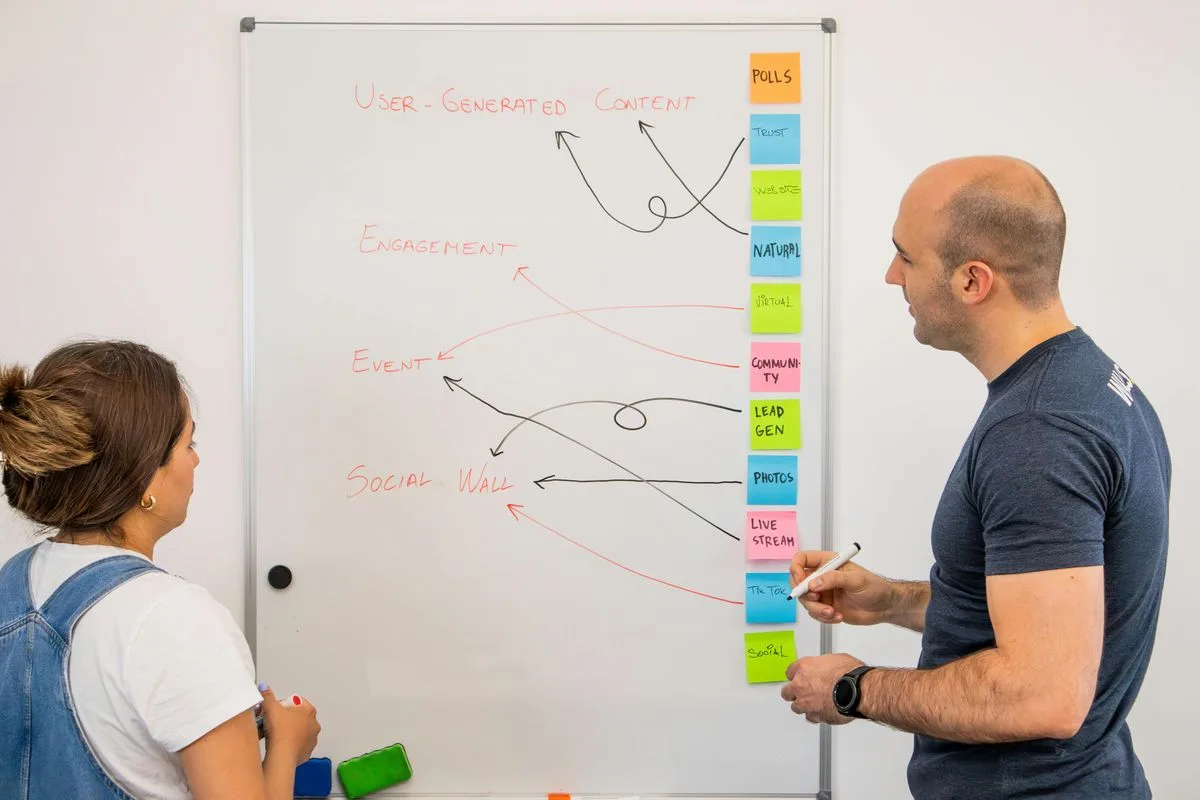Growleady Team
Lead Generation Experts
What Matters to B2B Buyers: Key Factors Driving Purchases
Explore the key drivers of B2B purchasing, from quality and pricing to expertise and partnership potential. Learn to build lasting client relationships.

Understanding what drives B2B buyers is essential in today’s competitive business landscape. Whether you’re a seasoned sales professional or just starting, knowing what matters most to these decision-makers can give you a powerful advantage.
Think about it: B2B buyers aren't just looking for products or services. They're seeking solutions to their complex business challenges. What drives their decisions? Is it price, quality, or something else entirely? In this text, we'll jump into the key factors that influence B2B buying decisions and explore how you can leverage this knowledge to boost your sales strategy.
Understanding the B2B Buyer's Journey
The B2B buyer's journey is a complex process that involves multiple stages and stakeholders. Understanding this journey is crucial for businesses to engage potential customers and close deals effectively.
Key Stages in the Decision-Making Process
Problem Identification:
Buyers recognize a business need or challenge
They start researching potential solutions
Information Gathering:
Buyers collect data on available options
They compare different products and suppliers
Evaluation of Alternatives:
Decision-makers assess the pros and cons of each option
They consider factors like product quality, price, and supplier reputation
Vendor Selection:
Buyers narrow down their choices to a shortlist of vendors
They may request demonstrations or trials
Negotiation and Purchase:
Final discussions on terms, pricing, and contract details
The actual purchase decision is made
Implementation and Review:
The chosen solution is implemented
Buyers evaluate the effectiveness of their decision
To improve your lead generation efforts, tailor your outreach to address the specific stage your prospect is in. For example, if they're in the information-gathering stage, provide detailed product comparisons and case studies to help them make a well-informed choice.
The Role of Stakeholders

In B2B transactions, multiple stakeholders influence the buying decision:
End Users:
Employees who will directly use the product or service
They focus on functionality and ease of use
Technical Buyers:
IT professionals or specialists who assess technical aspects
They evaluate compatibility, security, and integration capabilities
Financial Buyers:
CFOs or financial managers who analyze costs and ROI
They're concerned with budget implications and long-term value
Executive Decision Makers:
C-suite executives who make the final call
They consider strategic fit and overall business impact
Influencers:
External consultants or industry experts
They provide additional insights and recommendations
When reaching out via cold email or LinkedIn, identify the role of your contact and customize your message accordingly. For instance, when contacting a technical buyer, highlight your product's integration capabilities and security features.
Remember, the B2B buying process isn't linear. Stakeholders may revisit earlier stages as new information emerges. Your outreach strategy should be flexible enough to accommodate this cyclical nature.
A common mistake in B2B outreach is focusing solely on the decision-maker. While they have the final say, influencing other stakeholders can significantly increase your chances of success. Growleady’s expertise in targeted lead generation can help you create messaging that addresses the concerns of each stakeholder group effectively.
To incorporate these insights into your lead generation efforts:
Map out the typical buying journey for your product or service
Create targeted content for each stage of the journey
Identify key stakeholders in your prospect's organization
Tailor your outreach to address each stakeholder's specific concerns
Use a mix of channels (email, LinkedIn, phone) to reach different stakeholders
Provide value at every touchpoint, not just pitching your product
By understanding the B2B buyer's journey and the role of various stakeholders, you'll be better equipped to generate quality leads and guide them towards a purchase decision.
Product Quality and Performance
B2B buyers prioritize product quality and performance as critical factors in their purchasing decisions. You'll need to address these key aspects to win over potential clients and generate more leads.
Reliability and Durability
When it comes to B2B products, reliability and durability are non-negotiable. Your potential clients are looking for solutions that won't let them down.
Uptime is crucial in the B2B world. A product that's consistently available and performs reliably can make or break a business relationship. For example, if you're selling cloud storage solutions, even a few minutes of downtime can cost your clients thousands of dollars in lost productivity.
To showcase your product's reliability:
Provide detailed uptime statistics
Offer case studies of long-term clients
Highlight any redundancy or failover systems in place
Durability goes hand-in-hand with reliability. B2B buyers often look for products that can withstand heavy use over extended periods. This applies to both physical products and software solutions. For instance, if you're selling industrial equipment, emphasize its ability to operate continuously in harsh environments.
Remember, B2B relationships are built on trust. Demonstrating your commitment to long-term support can set you apart from competitors. Consider offering:
24/7 customer support
Regular maintenance and updates
Comprehensive warranties or service level agreements
Customization Options
B2B buyers aren't looking for one-size-fits-all solutions. They need products that can adapt to their unique business processes and challenges.
Flexibility in invoicing and payment processes is a key consideration. Your potential clients might have specific requirements for:
Invoice formats
Payment terms
Billing cycles
By offering customizable invoicing options, you're showing that you understand and can accommodate their financial processes.
But customization goes beyond just billing. B2B buyers often need products that can integrate seamlessly with their existing systems. For example, if you're selling CRM software, the ability to customize fields, workflows, and integrations can be a major selling point.
To highlight your product's customization capabilities:
Provide examples of how different clients have tailored your product
Offer a demo that showcases customization options
Emphasize your willingness to work with clients on unique solutions
Remember, the more you can tailor your product to a client's specific needs, the more valuable it becomes to them. This not only helps in closing deals but also in building long-term relationships that can lead to referrals and repeat business.
By focusing on product quality, performance, reliability, and customization options, you'll be addressing key concerns of B2B buyers. This approach can significantly boost your lead generation efforts, whether you're reaching out via cold email or LinkedIn outreach.
Competitive Pricing and Value Proposition
Competitive pricing and a strong value proposition are crucial factors for B2B buyers. These elements significantly influence purchasing decisions and can make or break a deal.
Total Cost of Ownership
B2B buyers don't just look at the upfront price tag; they're focused on the total cost of ownership (TCO). Here's what you need to know:
TCO includes the initial purchase price, implementation costs, maintenance fees, and ongoing support expenses.
Buyers want a clear breakdown of all costs associated with your product or service over its lifetime.
Provide tools or calculators that help prospects estimate their TCO, making it easier for them to justify the investment to stakeholders.
Highlight cost savings in areas like reduced downtime, increased productivity, or decreased resource requirements.
Remember, transparency is key. Don't hide fees or surprise buyers with unexpected costs down the line. Instead, be upfront about all expenses and demonstrate how your solution provides long-term value even though there are potentially higher initial costs.
Return on Investment
Return on Investment (ROI) is a critical factor in B2B purchasing decisions. Here's how to address it effectively:
Clearly articulate how your product or service will generate a positive ROI.
Use case studies and testimonials to showcase real-world examples of ROI achieved by other clients.
Provide ROI calculators or worksheets that help prospects quantify potential benefits.
Break down ROI into tangible metrics like increased revenue, cost savings, or improved efficiency.
Discuss both short-term and long-term ROI to appeal to different stakeholders within the buying organization.
When discussing ROI, avoid making grandiose claims. Instead, use realistic, data-driven projections backed by solid evidence. This approach builds credibility and trust with B2B buyers, who are often skeptical of overly optimistic promises.
By focusing on competitive pricing, value proposition, TCO, and ROI, you'll address key concerns of B2B buyers. This approach not only helps in lead generation but also sets the foundation for long-lasting business relationships built on trust and mutual benefit.
Excellent Customer Service and Support
B2B buyers prioritize exceptional customer service and support when making purchasing decisions. It's a critical factor that can make or break a deal, influencing long-term business relationships and client retention.
Responsive Communication
Prompt and effective communication is essential in B2B relationships. You'll gain a competitive edge by:
Offering multiple communication channels (phone, email, chat)
Providing quick response times (within 1-2 hours during business hours)
Assigning dedicated account managers for personalized support
Using CRM systems to track and manage customer interactions
For example, a 24/7 chatbot can be used for initial inquiries and to route complex issues to human representatives. This approach ensures round-the-clock availability while maintaining a personal touch.
Avoid common pitfalls like:
Automated responses that don't address specific concerns
Inconsistent information across different communication channels
Neglecting to follow up on resolved issues
To improve your communication strategy, consider:
Regular training for support staff on product knowledge and soft skills
Implementing a knowledge base for quick issue resolution
Utilizing customer feedback to continually refine your support processes
Post-Purchase Assistance
After-sales support is crucial for building long-term B2B relationships. Enhance your post-purchase assistance by:
Offering comprehensive onboarding and training programs
Providing regular software updates and maintenance services
Implementing a tiered support system based on client needs
Conducting periodic check-ins to ensure customer satisfaction
For instance, create a client portal where customers can access training materials, submit support tickets, and track their account history. This self-service option empowers clients while reducing support workload.
Common mistakes to avoid in post-purchase support include:
Neglecting to address minor issues that could escalate
Failing to provide proactive maintenance and updates
Not soliciting feedback on product performance and support quality
To optimize your post-purchase assistance:
Develop a customer success program to ensure clients achieve their desired outcomes
Offer scalable support packages to accommodate growing businesses
Use data analytics to predict and prevent potential issues before they arise
By focusing on responsive communication and robust post-purchase assistance, you'll build trust with B2B buyers and increase the likelihood of repeat business and referrals.
Industry Expertise and Thought Leadership

B2B buyers value partners who demonstrate deep industry knowledge and offer valuable insights. Establishing your company as a thought leader can significantly influence purchasing decisions.
Demonstrating Domain Knowledge
Showcase your expertise through:
Insightful blog posts addressing industry-specific challenges
White papers detailing innovative solutions to common problems
Case studies highlighting successful implementations
Speaking engagements at industry conferences and events
Webinars exploring emerging trends and technologies
By consistently producing high-quality content, you'll position your company as a trusted resource. This builds credibility and increases the likelihood of B2B buyers considering your products or services.
Providing Valuable Insights
Offer actionable insights that help B2B buyers:
Identify emerging market trends before competitors
Optimize their operations for increased efficiency
Mitigate industry-specific risks
Capitalize on new opportunities for growth
Adapt to regulatory changes affecting their business
Deliver these insights through:
Regular industry reports analyzing market data
Personalized consultations addressing unique challenges
Email newsletters featuring curated industry news
Social media posts sharing quick tips and observations
Podcast episodes discussing hot topics with industry experts
By providing valuable insights, you'll establish your company as an indispensable partner in your clients' success. This approach fosters trust and loyalty, increasing the likelihood of long-term business relationships.
Remember, B2B buyers are looking for partners who can help them navigate complex industry landscapes. By demonstrating your expertise and offering valuable insights, you'll position your company as the go-to resource for their business needs.
Long-Term Partnership Potential
B2B buyers prioritize long-term partnership potential when making purchasing decisions. They seek vendors who'll provide ongoing support and grow alongside their business.
Scalability and Future-Proofing
Scalability is a cornerstone of B2B buying decisions. You're not just selling a product or service; you're offering a solution that'll adapt to your client's evolving needs. B2B buyers look for partners who can support their growth trajectory.
When pitching to potential clients, highlight how your offering scales:
Demonstrate flexible pricing models that accommodate business growth
Showcase modular solutions that can be expanded or customized
Provide case studies of clients who've successfully scaled with your product
Remember, 72% of B2B companies that sell via seven or more channels grew their market share. This statistic underscores the importance of omnichannel excellence. Offer multiple touchpoints for your clients to interact with your brand, from digital platforms to in-person support.
Future-proofing is equally crucial. B2B buyers want assurance that your solution won't become obsolete. Address this concern by:
Regularly updating your product roadmap
Investing in R&D and staying ahead of industry trends
Offering seamless integration with emerging technologies
Alignment of Business Goals
B2B buyers evaluate how products or services align with their business goals and operations. It's not enough to offer a great product; you need to demonstrate how it fits into their broader strategy.
To effectively align with your prospects' business goals:
Research their industry and specific challenges
Tailor your pitch to address their unique pain points
Illustrate how your solution contributes to their KPIs
By 2025, 80% of B2B sales interactions will occur via digital channels. This shift presents an opportunity to showcase your alignment through:
Personalized digital content that speaks to specific industry needs
Interactive demos that allow prospects to visualize your solution in their context
Data-driven insights that demonstrate the potential impact on their business
Remember, 75% of B2B buyers prefer a rep-free sales experience. This preference doesn't mean eliminating human interaction entirely, but rather providing self-service options and clear, concise information that allows buyers to make informed decisions independently.
To cater to this preference:
Create comprehensive, easily navigable product documentation
Offer interactive pricing calculators and comparison tools
Provide detailed case studies and success metrics
By focusing on long-term partnership potential, scalability, future-proofing, and alignment with business goals, you'll position yourself as a valuable partner rather than just another vendor. This approach builds trust and increases the likelihood of securing and retaining B2B clients in today's competitive world.
Conclusion
Understanding what matters most to B2B buyers is crucial for success in today's competitive market. By focusing on product quality, reliability, and competitive pricing while demonstrating industry expertise, you'll position your company as a trusted partner.
Highlight your long-term partnership's potential scalability and alignment with business goals. Embrace digital channels and offer personalized data-driven content to meet evolving buyer preferences.
Remember, B2B buyers seek more than just products – they want solutions that drive growth and efficiency. By addressing these key factors, you'll build stronger relationships with B2B clients and set your business up for long-term success.
Frequently Asked Questions
What are the key factors in understanding B2B buyers' needs?
Understanding B2B buyers' needs involves focusing on product quality, reliability, and durability. It's crucial to tailor outreach strategies and emphasize competitive pricing, value proposition, total cost of ownership (TCO), and return on investment (ROI). Additionally, demonstrating industry expertise and thought leadership can significantly influence purchasing decisions.
How can a company demonstrate industry expertise to B2B buyers?
A company can showcase industry expertise by creating insightful content such as blog posts, white papers, and case studies. Participating in speaking engagements and providing valuable insights on market trends, operational optimization, and growth opportunities through reports, consultations, and newsletters also helps. Consistent engagement on social media platforms can further reinforce a company's position as a trusted resource.
Why is long-term partnership potential important in B2B purchasing decisions?
Long-term partnership potential is crucial because B2B buyers seek scalable solutions that can grow with their business. They prioritize future-proofing their investments and aligning with strategic objectives. By demonstrating how your offerings can scale, remain relevant, and support clients' long-term goals, you position your company as a valuable partner rather than just a vendor.
How has B2B sales interaction changed recently?
B2B sales interactions have shifted towards digital channels. Buyers now prefer personalized, data-driven content and self-service options. There's a growing trend towards rep-free sales experiences, with buyers conducting independent research before engaging with sales representatives. Companies need to adapt by providing comprehensive online resources and easy-to-use self-service tools.
What role does thought leadership play in influencing B2B purchasing decisions?
Thought leadership plays a significant role in influencing B2B purchasing decisions by positioning a company as an industry expert. By sharing valuable insights, companies can build trust and credibility with potential buyers. This can be achieved through creating high-quality content, speaking at industry events, and offering expert consultations, which helps in fostering long-term relationships with clients.


